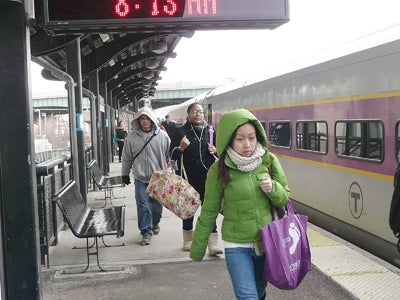Top transportation officials and transit activists have contradicting interpretations of the Legislature’s intent when it enacted a cap on public transit fare increases two years ago.
Transportation Secretary Stephanie Pollack told reporters the law limits MBTA fare increases to no more than 10 percent every two years. Activists say that’s twice as high as the Legislature intended.
Charlie Ticotsky, policy director for Transportation for Massachusetts, allowed that the law could be read to mean a 10 percent increase, but he said the legislative intent was to limit fare hikes to 5 percent every two years, and contended that there is evidence elsewhere in the law that suggest lawmakers intended the 5 percent limit.
The law states, “The authority shall not increase fares at intervals of less than 24 months or at an annual rate greater than 5 per cent.”
Ticotsky said the word “annual” – which appears to allow for two 5 percent increases every two years – was added during conference committee negotiations, a closed-door process where House and Senate members attempt to reconcile the two branches’ varying versions of a bill.
During a Saturday session in April 2013, the Senate adopted an amendment sponsored by then Sen. Katherine Clark, who is now a member of Congress, that installed a 5-percent, two-year cap on fare hikes without the word “annual.”
Ticotsky and others argued the Baker administration’s interpretation of the law is a departure from the previous Patrick administration’s, which initiated a 5 percent fare increase last year. In April, an MBTA spokesman responding to a query about the cap on fare hikes said, “[T]he MBTA cannot raise fares more than 5 percent or more often than every two years.”
In an email Monday, spokesman Joe Pesaturo maintained that his April email was consistent with Pollack’s comments. Explaining that in April he was referencing an annual cap, Pesaturo on Monday wrote, “My email said nothing about the level of an increase every two years.”
“What we have is the legislative language,” said Pollack, who explained the administration has sketched in a 5 percent increase as a “working number” into its budget plans and promised an involved public process before fares are increased. The earliest fares can be increased is next July.
Rafael Mares, vice president and director of Healthy Communities and Environmental Justice at the Conservation Law Foundation, raised the issue at Monday’s MBTA Fiscal and Management Control Board meeting.
“It’s not a good idea to pursue a fare increase over five percent,” Mares told the board, predicting that if the board attempted a larger increase, officials would hear from a range of people whose freedom of movement would be restricted.
Mares said he supports “regular and planned” fare increases, which is what the law intended to enforce after years of sporadic and significant fare hikes.
In another section of the 2013 law, the bill language refers to efforts “necessary to limit increases to not more than 5 per cent every 24 months.”
“The previous administration interpreted it at 5 percent,” said Ticotsky, who highlighted the other section for reporters.

